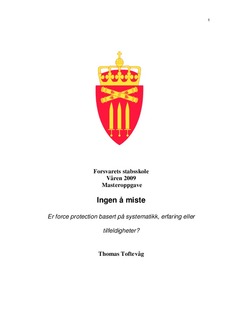| dc.description.abstract | Military power is an instrument of the state to carry out tasks which require different tools or are too risky for other national bodies or instruments. There is an inherent tension between the need to deploy Norwegian forces to armed conflicts and the apparent lack of will to expose the same forces to risks. Due to lack of Norwegian definitions of Force Protection a part of this study has been devoted to define Force Protection. Very briefly, this study has defined FP as a joint function, offensive and defensive in nature and as everybody’s responsibility. The second and major part of the study is devoted to answer what governs Norwegian force protection in international operations? Data is gathered by studying documents and interviewing personnel who, by work experience, has knowledge of FP. To govern has been operationalised to contextual factors, such as:
· Goals and strategy
· Organisational structures
· Organisational culture
· Power
The study has concluded that Norwegian Force Protection seems to resemble mostly to garbage can theory, however there are some findings which are more related to organisations as rational actor theory and learning organisation theory. The major findings suggesting that garbage can theory were most representative are different goals and strategy for FP, lack of jointness and how Force Protection is prioritised different by Norwegian forces nationally and deployed. Keywords are chance and flexibility. | en_US |
